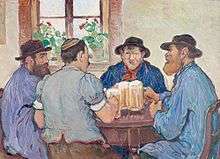Definify.com
Webster 1913 Edition
Compotator
Com′po-taˊtor
,Noun.
[L.]
One who drinks with another.
[R.]
Pope.
Webster 1828 Edition
Compotator
COMPOTATOR
,Noun.
Definition 2026
compotator
compotator
English
Noun
compotator (plural compotators)
- One who drinks (alcoholic beverages) with another; a fellow drinker.
- 1731 August 23, Alexander Pope; William Roscoe, “Letter VIII. To John Knight, Esq.”, in The Works of Alexander Pope, Esq. With Notes and Illustrations by Himself and Others. To which are Added, a New Life of the Author, an Estimate of His Poetical Character and Writings, and Occasional Remarks by William Roscoe, Esq. In Ten Volumes, volume IX, London: Printed for C[harles] and J[ohn] Rivington [et al.], published 1824, OCLC 606199624, page 438:
- I shall yet think it a diminution to our happiness, to miss of half our companions and compotators of syllabub, not to have Mr. Newsham and his dogs, and his preceptors, and his dearly-beloved cousin, and his mathematics, and his Greek, and his horses.
- 1771 June 17, Tobias Smollett, The Expedition of Humphry Clinker. [...] In Three Volumes, volume III, London: Printed for W. Johnston, in Ludgate-Street; and B. Collins, in Salisbury, OCLC 744959920, page 225:
- […] Charles Denniſon, who deſires to be remembered to you, would be rejoiced to ſee his old compotator; but as I am now ſtationary, I expect regular anſwers to the epiſtles of, yours invariably, Matt. Bramble.
- 1810 November, “Art X. Anonymiana; or Ten Centuries of Observations on various Authors and Subjects. Compiled by a late very learned and reverend Divine; and faithfully published from the original MS. with the Addition of a copious Index. 8vo. pp. 527. 12s. Boards. Longman and Co. 1809.”, in The Monthly Review; or Literary Journal, Enlarged, volume LXIII, London: Sold by Becket and Porter, booksellers, in Pall Mall, OCLC 298518104, page 308:
- Our modern Bacchanalians, whose feats are recorded by the bottle, and who insist on an equality in their rival combats, will find some ingenuity in the invention among our ancestors of their Peg-tankards, of which a few many occasionally still be found in Derbyshire: / 'They have in the inside a row of eight pins one above another, from top to bottom; […] The first person that drank was to empty the tankard to the first peg, or pin; the second was to empty to the next pin, &c. by which means the pins were so many measures to the compotators, making them all drink alike, or the same quantity; and as the distance of the pins was such as to contain a large draught of liquor, the company would be very liable by this method to get drunk, especially when, if they drank short of the pin, or beyond it, they were obliged to drink again. […]'
- 1820, Walter Scott, “Introduction to Ivanhoe”, in Ivanhoe: A Romance, Edinburgh: Printed for Archibald Constable and Co. Edinburgh; and Hurst, Robinson, and Co. 90, Cheapside, London, OCLC 5663356; republished as Ivanhoe; a Romance. [...] In Two Volumes (Waverley Novels; 15), volume I, Parker's edition, Boston, Mass.: Samuel H[ale] Parker, 164 Washington-Street, 1831, OCLC 191248655, page xi:
- [T]he hospitable anchorite […] dispatches an assistant to fetch a pot of four gallons from a secret corner near his bed, and the whole three set in to serious drinking. This amusement is superintended by the Friar, according to the recurrence of certian fustian words, to be repeated by every compotator in turn before he drank—a species of High Jinks, as it were, by which they regulated their potations, as toasts were given in latter times.
- 1830, Richard Warner, “chapter XIII”, in Literary Recollections, volume II, London: Longman, Rees, Orme, Brown, and Green, OCLC 6065177, page 6, footnote:
- Many of my readers will recollect the memorable night, on which William Pitt and his ingenious friend and jovial compotator, Harry Dundas, went into the House of Commons, in a condition usually described by the phrase "of being half seas over."
- 1856 July, G. Hill, “Traces of Sappho, the poetess”, in Graham's Illustrated Magazine of Literature, Romance, Art, and Fashion, volume XLIX, number 1, Philadelphia, Pa.: Watson & Co., publishers, OCLC 32148084, page 71, column 1:
- "Admirable as this ode is," says a quaint, old annotator, "I am resolved not to touch it. True I was once enamoured of Sappho, but the reprobate, and her compotator (Anacreon) having well-nigh ruined me, expect not here a syllable in even seeming commendation of either her or her works, than which, in Greece, nothing was deemed more elegant, spirited, or graceful." So moralizes Tanaquillurs Faber; with a pertinence for which, we fear, he is indebted much less to Sappho and her imaginary compotator, than to the Cyprus wherewith he was wont, both as a classic and a lover, to enliven the tedium of his erudite vigils.
-
